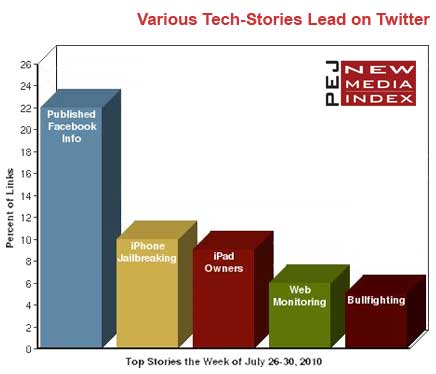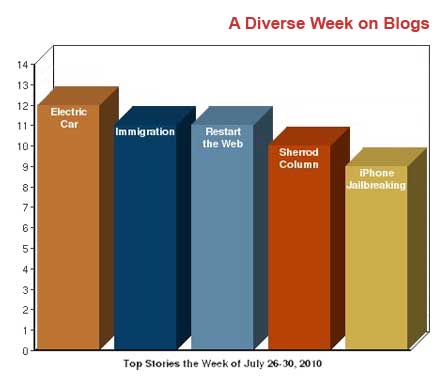
 Two consumer-related technology topics dominated among Twitter users last week-privacy on the social networking site Facebook and user rights with Apple’s popular iPhone device. The attention speaks to the social media’s role as a kind of consumer watchdog for the online community, though in this instance some felt the significance of the Facebook event had been overplayed.
Two consumer-related technology topics dominated among Twitter users last week-privacy on the social networking site Facebook and user rights with Apple’s popular iPhone device. The attention speaks to the social media’s role as a kind of consumer watchdog for the online community, though in this instance some felt the significance of the Facebook event had been overplayed.
For the week of July 26-30, fully 22% of the news links on Twitter were about the publication of millions of Facebook users’ personal information, according to the New Media Index produced by the Pew Research Center’s Project for Excellence in Journalism.
Canadian researcher Ron Bowes, in his role as a cyber security consultant, created a program that scanned 100 million profiles on Facebook, collected publicly available information and shared that information as a downloadable file. Bowes claimed he published the data in order to highlight problems with privacy on Facebook. However, Facebook itself downplayed the situation, saying the information on the list was already freely available online.
Although the data that Bowes gathered was public, the fact that he collected so much of it and made it so readily available to anyone, including major corporations, raised some concerns about how much privacy Facebook users effectively forfeit.
The tweets linked to a variety of news stories about the incident, such as this one by the BBC. Among users who included comments, the verdict seemed to be mixed between those complaining that Facebook was not concerned enough with privacy and those who felt the story was overblown since the compiled information was never made private.
Last week’s second largest subject on Twitter, at 10%, involved a ruling by federal regulators that "jailbreaking" Apple’s iPhone-the practice of hacking the device’s operating system in order to run applications not approved by Apple-is legal and not prevented by any copyright law. The same subject was also the fifth-largest story on blogs last week (at 9% of the links).
The response from Twitterers and bloggers was overwhelmingly supportive of the decision by the Library of Congress (which runs the copyright office) because it would give consumers more choice, especially if they wanted another phone provider to use with their iPhone other than the device’s default provider AT&T.
These two subjects have been a frequent topic of conversation in social media, with bloggers in particular focusing on Facebook and privacy issues. From May 24-28, 2010, for example, the No. 1 story on blogs (at 37% of the week’s links) involved criticism that the company’s privacy settings were too complicated.
This also marked the third week in a row when an iPhone-related story was among the top subjects on Twitter. One week earlier, an article detailing Apple’s troubles with its iPhone and AT&T was the No. 2 story. The week before that, the top issue was antenna problems associated with the iPhone 4.
The third subject on Twitter last week, at 9%, also involved Apple, in this case some new data about iPad owners. According to a study by the consumer research firm MyType, people who own Apple’s iPad are six times more likely to be "wealthy, well-educated, power-hungry, over-achieving, sophisticated, unkind and non-altruistic 30-50 year olds," achieving the company label of "selfish elites."
Fourth, at 6%, was an exclusive Wired story about investments made by the CIA and Google in Recorded Future, a company that monitors in real time the relationships on the web among people, organizations, actions and incidents and uses that information to try and predict the future.
And fifth, at 5%, was a BBC story about Catalonia becoming the first Spanish province to ban bullfighting.
In the blogosphere, the attention was divided quite evenly between five different subjects, including the iPhone "jailbreaking" story.
No. 1, at 12% of the week’s links, was a Washington Post report that the price of General Motor’s new electric car, the Chevrolet Volt, will be $41,000. Many bloggers thought the car was too expensive and inefficient, and some said the price tag showed that President Obama’s bailout of the car industry was a failure.
 That was followed by another Washington Post story, at 11%, reporting that the Obama Administration is deporting record numbers of illegal immigrants. Third, also at 11%, was a BBC story about Paul Kane, a British entrepreneur who was selected to look after one of seven high tech cryptographic keys which will "restart" the Internet in the event of a worldwide catastrophic occurrence.
That was followed by another Washington Post story, at 11%, reporting that the Obama Administration is deporting record numbers of illegal immigrants. Third, also at 11%, was a BBC story about Paul Kane, a British entrepreneur who was selected to look after one of seven high tech cryptographic keys which will "restart" the Internet in the event of a worldwide catastrophic occurrence.
Fourth, at 10%, was a piece by Washington Post columnist E.J. Dionne Jr. criticizing the mainstream press for "cowering" to right wing outlets in its coverage of Shirley Sherrod, the USDA employee prematurely fired after a conservative website released a misleading video that made her seem biased against a white farmer.
And fifth, at 9%, was a Washington Post report about the legal decision to allow for "jailbreaking" the iPhone.
Facebook Privacy
On July 29, news broke that the personal details of about 100 million Facebook users had been collected and published online by a security consultant. The list was then posted on a file-sharing site and downloaded by more than 1,000 companies and individuals.
The vast majority of tweets about the subject simply relayed the information about the incident and included a link to a news report with messages such as, "BBC News – Details of 100m Facebook users collected and published."
A number of people, went further, however, and blamed Facebook.
Several included the words, "FACEBOOK: RESPECT OUR PRIVACY" in their tweets.
"It was just a matter of time: 100 million Facebook users’ details published online (AGAIN): Your info IS out there…" wrote Gniewomir Świechowski.
"Personal info of 100 mn Facebook users leaked – Good going FACEBOOK!" added wtf_nyc.*
Others thought users should have already known about the problems with Facebook’s privacy settings.
"Nothing we don’t alrdy know about FB privacy issues, but having yr info up for grabs on PirateBay might change yr mind," tweeted Arlene Rebecca.
"LOL at the naivety of people thinking the torrent of collected FB data means companies just now getting all this info," agreed Ryan Schroeder.
And some criticized the media’s coverage of the event.
"STOP THE MEDIA PANIC!" demanded Donna Lee Nardo. "Ron Bowes’ Facebook torrent file really doesn’t reveal much info that is not already available!"
iPhone Jailbreaking
The response in social media was overwhelmingly supportive of the July 26 decision by The Library of Congress, which oversees the copyright office, to declare that "jailbreaking" the iPhone was legal.
"…and good news also for all iphone users 😉 Finaly jailbreaking your iphone is legal!" tweeted Andrej Mitas.
"A win for freedom in mobile world," concluded Kai En Lam.
"Dear Mr Jobs…go hug a tree…spread the joy…it’s all good…those smart iPhone owners who jailbreak are good," added Mahesh Keshavamurthy.
A number of bloggers also joined in the chorus.
"Good news for iPhone users," proclaimed Shabnam Sultan of Techiez Lounge. "Apple has previously said that Jailbreaking is illegal. This new rule is for sure going to give a jolt to Apple."
A minority of bloggers, however, felt the ruling was not very significant.
"It’s one of those things that will be trumpeted as a triumph of freedom over DRM [digital rights management]," wrote Tequila Bomb. "After that the impact it has on our daily lives will be absolutely zero. Those that are willing to jailbreak, already have done. Those that weren’t going to, still won’t."
The Chevrolet Volt
The unveiling of General Motor’s new electric car, the Chevrolet Volt, received significant criticism from bloggers, both for its cost and for the connection to Obama’s decision to bailout the American auto industry.
"It’s another prime example of the government in action. According to just released information, a low-end Volt will cost $41,000. That’s right, 41k for a car that goes only 40 miles on its battery charge," complained The Unreligious Right. "Even after a decade of production, hybrids have less than 3% of the market. Most people just aren’t willing to waste extra money in order to pretend they are being more environmentally conscious. So why are we blowing taxpayer money funding this sort of GM product?"
"The Obama Volt Machine Will Achieve a WHOPPING 40 Miles!" posted The Snooper Report. "I can hardly wait to pass all of the MORONS that buy this car and get stuck along the road! 40 miles on electric batteries. WOW! GREAT JOB!"
YouTube
In a way, it was re-run week for YouTube. The two most-viewed news clips both made the list for the second week in a row. Both obviously struck a chord, although neither could be characterized as having major news value.
The No. 1 video, for the second consecutive week, was a short report by the television news program


